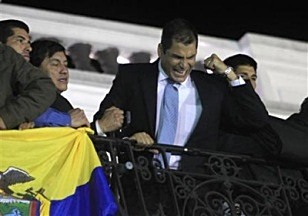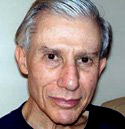Ecuador to Washington and Britain: Go to Hell!

For around two months, Julian Assange has been holed up in Ecuador's London embassy after requesting political asylum. Sweden wants him extradited on spurious charges. They include unlawful coercion, sexual molestation and rape. Allegedly it's for having nonconsensual condomless sex. A honey trap snared him. Sex charges are bogus. Sweden represents Washington's interests. Obama officials wants him extradited to stand trial for whistleblowing. They want him put away and silenced. Sweden's playing willing co-conspirator. So is Britain.
On August 16, word came. Asylum was granted short of freedom to leave Britain unarrested. Foreign Minister Ricardo Patino said "Ecuador decided to grant political asylum to Julian Assange following the request sent to the President."
He faces likely extradition to a third country without proper guarantees. If tried in America, it won't be fair. Patino called Ecuador's decision "protected by international law."
Shortly before Patino's announcement, President Raphael Correa signaled his likely decision by twittering "No one is going to terrorize us."
Earlier, Patino released details of a letter from Britain's Quito embassy, saying:
"You need to be aware that there is a legal base in the UK, the Diplomatic and Consular Premises Act 1987, that would allow us to take actions in order to arrest Mr Assange in the current premises of the embassy." "We need to reiterate that we consider the continued use of the diplomatic premises in this way incompatible with the Vienna convention and unsustainable and we have made clear the serious implications that this has for our diplomatic relations."
In response, Patino expressed shock and outrage, saying:
"Ecuador, as a state that respects rights and justice and is a democratic and peaceful nation state, rejects in the strongest possible terms the explicit threat of the British official communication." "This is unbecoming of a democratic, civilised and law-abiding state. If this conduct persists, Ecuador will take appropriate responses in accordance with international law." "If the measures announced in the British official communication materialize they will be interpreted by Ecuador as a hostile and intolerable act and also as an attack on our sovereignty, which would require us to respond with greater diplomatic force." "Such actions would be a blatant disregard of the Vienna convention on diplomatic relations and of the rules of international law of the past four centuries." "It would be a dangerous precedent because it would open the door to the violation of embassies as a declared sovereign space."
UK officials softened their position. They said they're "committed to reaching a mutually acceptable decision." Britain knows but didn't say that embassies are sovereign territory. Forced entry violates international law. Under Article 22(1) of the 1961 Vienna Convention on Diplomatic Relations:
"The premises of the mission shall be inviolable. The agents of the receiving State may not enter them, except with the consent of the head of the mission."
Article 22(3) states:
"The premises of the mission, their furnishings and other property thereon and the means of transport of the mission shall be immune from search, requisition, attachment or execution."
Article 29 adds:
"The person of a diplomatic agent shall be inviolable. He shall not be liable to any form of arrest or detention. The receiving State shall treat him with due respect and shall take all appropriate steps to prevent any attack on his person, freedom or dignity."
Article 30 grants the same inviolability and protection to a diplomatic agent's private residence, his or her papers, correspondence, and property.
At the same time, inviolability isn't extra-territoriality. In other words, embassy (diplomatic mission) grounds remain the territory of host nations. However, inviolability protects missions from forced entry. Doing so constitutes a serious breach of international law. If states want their diplomats given courtesy and respect, they're obligated to afford similar treatment to foreign representatives on their soil. They're also bound under international law provisions.
In 1987, Britain's Diplomatic and Consular Premises Act (DCPA) permits revocation of diplomatic mission status if it "ceases to use land for the purposes of its mission or exclusively for the purposes of a consular post." It further states doing so must be "permissible under international law."
The law followed the Libyan London embassy's 1984 siege. Someone inside the building fatally shot a UK police officer. An 11 day standoff ended with Britain severing diplomatic relations with Libya and expelling its diplomats. Forced entry didn't occur.
Using DCPA to seize Assange is problematic. Doing so would set a dangerous precedent and place its own diplomats at risk. DCPA addressed situations involving missions used for serious wrongdoing. Sheltering Assange hardly qualifies. Legitimate courts won't sanction forced entry. Britain claims it's duty bound to extradite. Obeying fundamental law takes precedence. So does doing the right thing and not running cover for Washington.
America wants Assange extradited for whistle blowing. Ecuador's President Rafael Correa believes he'll be imprisoned and may face the death penalty. He's wrongfully charged. He published thousands of leaked classified military, intelligence and political documents.
Skeptics call him compromised. He collaborated with Western media. He allied with managed news manipulators. Journalists connected to Washington's imperium are involved. At issue is whether released information represents truths, half-truths, selected truths, disinformation masquerading as real information, or a combination of all of the above. Skeptics say material disseminated was out-of-date and of little use. Major secrets remain safe.
Webster Tarpley, Wayne Madsen, Thierry Meyssan, and others call Assange politically connected, a stealth CIA asset, and perhaps used by Mossad the same way. Madsen said monied interests used him. He cited readily recognizable names. [*]
Perhaps Assange was used. Perhaps he knew and cooperated. Now he's no longer needed. Washington played this game before. Bin Laden is Exhibit A. Enlisted against Soviet Russia in Afghanistan, he became "enemy number one."
What's ahead for Assange remains uncertain. He's far more hero than villain. He deserves better than Washington plans. His leaks were important whether fresh or dated. He deserves full legal protections, freedom from lawless prosecution, and virtually certain conviction and imprisonment. What authorities did to Bradley Manning, they plan for Assange in spades. Ecuador wants it prevented. Doing so is heroic and just.
___________________________________________________________________________________
[*] Another World Is Possible does not subscribe to this point of view. So far, nothing of substance has been offered in support of this reckless opinion. — The main thing to keep in mind however is the sacrosanct human rights and of course the general principles of freedom of thought and speech, which must be defended at all times and everywhere. Between Julian Assange, a fellow human being, and CIA's evil pack of torturers chasing him, the choice is simple. Very much so.
___________________________________________________________________________________

Stephen Lendman: I was born in 1934 in Boston, MA. Raised in a modest middle class family, attended public schools, received a BA from Harvard University in 1956 and an MBA from the Wharton School at the University of PA in 1960 following 2 years of obligatory military service in the US Army. Spent the next 6 years as a marketing research analyst for several large US corporations before becoming part of a new small family business in 1967, remaining there until retiring at the end of 1999. Have since devoted my time and efforts to the progressive causes and organizations I support, all involved in working for a more humane and just world for all people everywhere, but especially for the most needy, disadvantaged and oppressed. My efforts since summer 2005 have included writing on a broad range of vital topics ranging from war and peace; social, economic and political equity for all; and justice for all the oppressed peoples of the world like the long-suffering people of Haiti and the Palestinians. Also co-hosting The Global Research News Hour, occasional public talks, and frequent appearances on radio and at times television. I also am a Research Associate of the Centre for Research on Globalization. I live in Chicago and can be reached at lendmanstephen@sbcglobal.net. Also visit my blog site sjlendman.blogspot.com and listen to The Lendman News Hour on RepublicBroadcasting.org Monday - Friday at 10AM US Central time for cutting-edge discussions with distinguished guests on world and national issues. All programs are archived for easy listening. My new book "How Wall Street Fleeces America: Privatized Banking, Government Collusion and Class War" can be ordered HERE.
___________________________________________________________________________________
Photo: © N/A
URL: http://www.a-w-i-p.com/index.php/2012/08/17/ecuador-to-washington-and-britain-lemggo
























